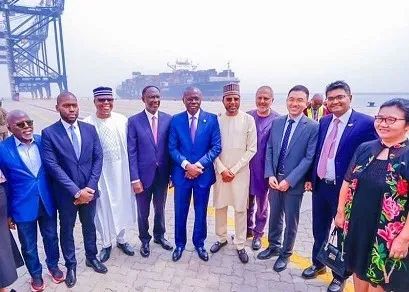Nigeria’s Lekki Deep Seaport on Monday received the 15,000 TEU LNG-powered CMA CGM Scandola — the largest container ship to visit the West African country.
CMA CGM Scandola is the first Liquefied Natural Gas (LNG) powered vessel to berth not only in Nigeria but also in the entire West Africa sub-region. The vessel has capacity to carry 15,128 TEUs, has a length overall of 366 meters and a width of 51 meters.
Lagos State Governor, Babajide Sanwo-Olu; Managing Director, Nigerian Ports Authority (NPA), Mohammed Bello Koko and the Chairman, Seaport Terminal Operators Association of Nigeria (STOAN), Princess Vicky Haastrup, were among dignitaries that welcomed the vessel to the port.
In his address, Sanwo-Olu affirmed that the accomplishment of Lekki port in welcoming the largest LNG-powered container vessel within just one year of commencement of operation has enshrined the name of Lagos and Nigeria as significant players in global port business.
“I think it’s a big feat. It’s something that we really need to roll out drums and get proud of because what that is about is that indeed, we’re putting Lekki Freeport, we’re putting Lagos, we’re putting Nigeria into the world’s global logistics marine business. This is a business that has been a privilege to a few countries, developed countries in America, in Europe, in the Far East, in some parts of Africa as well.
“But now, given the size of the business that can come to our community, the Lekki Freeport and the Lekki Port itself have put and enshrined our name as one of the big movers of port transactions in the world,” he said.
Speaking earlier, the minister of marine and blue economy, Adegboyega Oyetola who was represented by the Managing Director of Nigeria Ports Authority (NPA), Mohammed Bello Koko commended the promoters of the Lekki Deep Seaport and its eco-friendly measures, aligning with global efforts to reduce carbon intensity in international shipping.
The minister also praised the NPA’s compliance with the ministerial directive to embrace global energy transition in its port modernisation project.
The minister emphasised the pivotal role of shipping in global decarbonisation efforts, citing the IMO’s strategy aiming for a 40 percent reduction in carbon intensity by 2030.
He commended Lekki Deep Seaport for not only being Nigeria’s first deep seaport but also the first fully automated port, aligning with international standards.
Oyetola also shed light on the importance of Lekki Port’s natural depth, state-of-the-art equipment, and robust infrastructure, which positions it as a mega transshipment hub with a capacity of up to 1.2 million TEUs in its initial phase.
He stressed the imperative of making ports eco-friendly to comply with international regulations, pointing out Nigeria’s commitment to minimising air pollution by transitioning to LNG.
“The Ministry of Marine and Blue Economy is convinced that shipping has a pivotal role to play in global decarbonisation efforts, this is why I would like to seize this moment to commend the management of Nigerian Ports Authority’s compliance with the ministerial directive to take cognisance of global energy transition in its port modernisation project by deliberately factoring in measures that promote energy efficiency,” he said.
“Apart from its distinctive feature of eco-friendliness, Scandola ranks amongst the largest container ships to call in West Africa with 15,000 TEUs. Lekki Deep Seaport’s natural depth of 16 meters added to its multifaceted efficiencies, state-of-the-art equipment, and robust infrastructure which offers a capacity of up to 1.2 million TEUs in this phase 1 position the Port to serve as a mega transshipment hub, to Nigeria’s neighbouring countries in the Gulf of Guinea and beyond. With shipping volumes promising to get higher, forward-looking investments such as the one we are gathered here to celebrate will certainly have a big impact in the long run.
“The imperative of making our ports eco-friendly is no fluke. We will continue to support the NPA in its efforts to ensure stakeholders’ compliance with the International Maritime Organisation (IMO) sulphur regulation on Nigerian waterways. The driver of this change is the need to minimise the air pollution created in the shipping industry by reducing the sulphur content of the fuels that ships use. So transition to the use of natural gas, which is more environmentally friendly, by vessels plying our waterways is a most welcome development,” Oyetola said.
Copyright Ships & Ports Ltd. Permission to use quotations from this article is granted subject to appropriate credit given to www.shipsandports.com.ng as the source.

